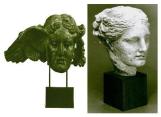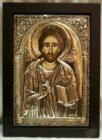2
Hermes with Infant Dionysos (replica).Date not available
Museum of Antiquities, University of Saskatchewan, Saskatoon, SK., Canada

3
Ancient Greek ReligionThe ancient Greeks were pagan peoples who worshipped a large number of divinities. Central among these were the twelve Olympian gods:
Zeus - Supreme God and Father of the Gods
Hera - Goddess of Marriage and the Wife of Zeus
Hermes - God of Commerce and Messenger of the Gods
Apollo - God of the Sun and Prophecy
Demeter - Goddess of the Earth and the Harvest
Hephaestus - God of the Forge and Fire
Athena - Goddess of Wisdom, Battle, Science, Education and Virginity
Poseidon - God of the Sea
Artemis - Goddess of the Hunt and the Moon
Ares - God of War
Dionysos - God of Wine, Emotion and Theatre
Aphrodite - Goddess of love and beauty
4
Hypnos Head (replica) left and Hygeia or Atalanta Head (replica) right.Date not available
Museum of Antiquities, University of Saskatchewan, Saskatoon, SK., Canada

5
The twelfth Olympian divinity, Dionysos, shared his position with the god of the underworld, Hades, and the goddess of the hearth, Hestia. The Olympian gods in no way account for the whole pantheon of Greek divinities. Various other divinities existed such as Asklepios, the god of healing, Hygiea, the goddess of cleanliness or "hygiene", and Hypnos, the god of sleep.6
Aphrodite of Arles (replica). Original from the 4th century BC in the Louvre, Paris.Date not available
Museum of Antiquities, University of Saskatchewan, Saskatoon, SK., Canada

7
Greek gods were venerated within temples that were set up to house the divinity rather than his or her congregation of worshippers. Invocations were made to the divinity by way of sacrifices, libations or votive offerings. An array of deities was available to the worshipper, depending upon the situation for which assistance was needed. For example, the god of healing, Asklepios, might be invoked to ward off a disease, or the sea god, Poseidon, to quell a storm at sea. The world of the ancient Greeks, then, must have seemed imbued with deities who were inherent in all places and things.8
Parthenon friezesDate not available
Museum of Antiquities, University of Saskatchewan, Saskatoon, SK., Canada

9
Greek gods were also often adored in religious festivals and games. One such occurrence was the Panathenaia in Athens. This festival consisted, in part, of an elaborate sacred procession to the Parthenon. This great structure was the shrine of the Athenian patron goddess, Athena. The frieze of the Parthenon depicts this ritual. Replicas of two panels from this frieze form part of the Museum of Antiquities' permanent collection. The scene on one panel represents two young aristocrats taking part in the cavalcade of horsemen. The other depicts three men and a horse preparing for the cavalcade. The Panathenaia festival appears to have reached its pinnacle with the changing of the goddess Athena's old peplos for a new one.11
Modern Greek ReligionThe Greeks no longer practice the pagan faith of their ancient ancestors but, as with much of the western world, elements of the ancient religion came to be incorporated into the sphere of Christianity which began to spread during the Roman period. Today the majority of Greeks belong to the Greek Orthodox religion. After Roman Catholicism and the Protestant religions, the Orthodox Church forms the largest branch of Christianity. A minority of Greeks, mostly of Turkish decent, subscribe to the Muslim faith. There are also in Greece a small number of followers of Roman or Greek Catholicism and Judaism.



